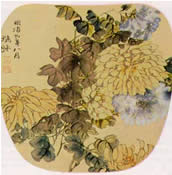 |
Chrysanthemums Zhao Zhiqian (1829-1884) |
Chung Yeung, the Chinese autumnal remembrance observance, is similar to the spring festival of Qing Ming, in that many families will take this time to visit ancestral graves to perform cleansing rituals and pay their respects. Occuring on the ninth day of the ninth month it is also known as Chung Gau, (chung, ‘double’, gau, ‘nine’).
A legend dating to the Han Dynasty (221-206 BCE) tells how a soothsayer advised a man to escape to the hills with his family in order to avoid disaster. The advice was taken, and when the family eventually returned to their home they discovered that a plague had struck in their absence. From then onward people tried to conjure health and good fortune on this date by having picnics on the tops of hills.
As autumn is the time when chrysanthemums are in bloom—the ninth month is also known as Chrysanthemum month—it is also tradition to include chyrsanthemum wine in the festival meal. Another common element of these picnics is a cake known as ko, which is a homonym of the word for ‘top’. The number 9 is considered especially auspicious by the Chinese, and by climbing hills and eating these cakes on the ninth day of the ninth month, some people believe that they will soon be promoted, i.e. they will rise to the top.